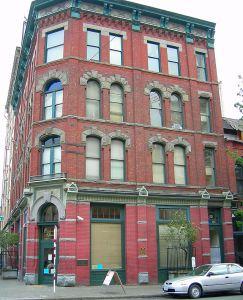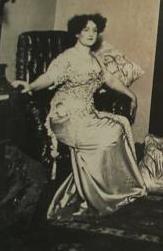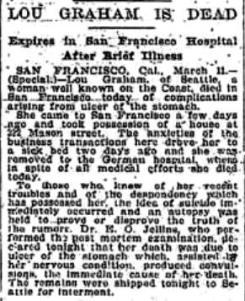More city business was transacted at Lou’s than at City Hall. – Bill Speidel
 Since I spent much of last month only a few blocks from the building which once housed her Seattle brothel, and was so welcomed by the city she helped build, it seems fitting that I should pay tribute to the life and legacy of Lou Graham (February 9, 1857 – March 11, 1903), the city’s most famous madam. As with most whores, there is a great deal of inconsistency and misinformation involved in her story; however, in Graham’s case it mostly surrounds her death rather than her life.
Since I spent much of last month only a few blocks from the building which once housed her Seattle brothel, and was so welcomed by the city she helped build, it seems fitting that I should pay tribute to the life and legacy of Lou Graham (February 9, 1857 – March 11, 1903), the city’s most famous madam. As with most whores, there is a great deal of inconsistency and misinformation involved in her story; however, in Graham’s case it mostly surrounds her death rather than her life.
As Thaddeus Russell explains in A Renegade History of the United States, the reason so many western states gave women the right to vote long before the eastern ones (or the country in general) had absolutely nothing to do with high-minded egalitarianism and everything to do with pragmatism and arse-kissing. You see, frontier populations are always disproportionately male because they tend to lack the sort of amenities “good” women tend to want. Accordingly, frontier towns fill up with lonely young men desperate for female company and usually possessed of money drawn from whatever industry the town is built on (whether that be mining, trapping, trade or whatever). Naturally, whores arrive to capitalize on this and so the minority of frontier populations which are female are usually made up largely of working girls. These ladies soon amass a disproportionate share of the wealth, and madams tend to become fabulously wealthy; in order to win their favor (the better to secure donations and investment in civic projects), city fathers all over the western US granted them suffrage. Seattle did this on November 23rd, 1883 and almost immediately regretted it; by the time the city had actually granted suffrage, the whores had been outnumbered by recently-arrived “good” women, who immediately repaid the “bad” sisters who had won the vote for them by electing “progressive” prohibitionists to enact new laws (and vigorously enforce old ones) restricting saloons, brothels, gambling and other “vices”. The result, naturally, was a dramatic loss of tax and license revenue, and by the time women’s suffrage was revoked by judicial fiat in 1887-88 the city’s finances were in shambles.
 Enter Dorothea Georgine Emile Ohben of Germany, a not-especially-beautiful 31-year-old whore gifted with charm, a gift for persuasion and business savvy. She approached a banker named Jacob Furth, and with his help convinced a number of local businessmen to invest in a truly world-class brothel staffed with beautiful, charming, educated women. Though the building she purchased (at the corner of Third and Washington) burned down in the Great Seattle Fire of June 6, 1889, she had already made enough money in her first year of business to rebuild immediately in stone; it was, in fact, the first building to re-open after the fire. Some say that the pleasures of her house were free to government officials, but whether that was true or not it is certain that she had considerable influence on the political class; though the area’s weird aversion to sex was already in evidence and resulted in periodic “vice crackdowns”, these never lasted long and Graham was always back in business practically overnight. The one instance in which she was actually arrested resulted in the political downfall of Henry White, the “reform” mayor who had presided over the police operation in question.
Enter Dorothea Georgine Emile Ohben of Germany, a not-especially-beautiful 31-year-old whore gifted with charm, a gift for persuasion and business savvy. She approached a banker named Jacob Furth, and with his help convinced a number of local businessmen to invest in a truly world-class brothel staffed with beautiful, charming, educated women. Though the building she purchased (at the corner of Third and Washington) burned down in the Great Seattle Fire of June 6, 1889, she had already made enough money in her first year of business to rebuild immediately in stone; it was, in fact, the first building to re-open after the fire. Some say that the pleasures of her house were free to government officials, but whether that was true or not it is certain that she had considerable influence on the political class; though the area’s weird aversion to sex was already in evidence and resulted in periodic “vice crackdowns”, these never lasted long and Graham was always back in business practically overnight. The one instance in which she was actually arrested resulted in the political downfall of Henry White, the “reform” mayor who had presided over the police operation in question.
Unlike some of the other madams I’ve discussed, Graham was far from shortsighted; she fully realized that the political climate might change at any time, resulting in the extinction of her business. So she invested heavily in the stock market and made a killing; on top of that, she made high-interest loans for business ventures that the city’s conservative bankers would not back, but which her friend and business associate Jacob Furth nevertheless felt were good risks. Many of the wealthy Seattle families who nowadays support prohibitionism and finger themselves furtively to “sex trafficking” fantasies enjoy fortunes founded on loans drawn from funds paid for sex…in other words, from the “avails of prostitution”. And that makes them, in the modern view, the descendants of indirect “pimps”. Indeed, given that a very large and publicly-announced deposit from Graham saved the Puget Sound National Bank (Furth’s institution) from a bank run during the Panic of 1893, it could also be said that everyone who has profited from investment in said bank for the past century was also a beneficiary of the “wages of sin”.
 None of this is controversial, but the end of her life (and its aftermath) is another matter. After yet another ridiculous “morality” crusade resulted in the closure of her brothel in December 1902, Graham suddenly decided not to bother re-opening in Seattle; she instead took off for San Francisco the following month, apparently intending to start up again there. Less than two months later she was dead, of causes that have never been adequately explained. Her obituary listed the cause as a perforated ulcer, possibly aggravated due to nerves brought on by her repeated harassment. A popular rumor of the time said it was actually suicide, and proponents of the “drug addict whore” and “diseased whore” myths favor the explanations of drug overdose and syphilis, respectively. Another odd point is that she appears to have died intestate, surely an unlikelihood for a woman so careful with business matters; the Seattle Times reported that there had been a will, but that it was torn to shreds during a violent argument between Lou and Amber Delmas the night before Lou died. Amber was described as her “housekeeper”, but it seems virtually certain that the two were lesbian partners; Amber had assisted Lou in running her business for years and accompanied her to San Francisco, and the general belief is that the destroyed will originally named Amber’s daughter Ulna as the chief heir. The daughter soon became the victim of a custody battle between her mother and busybodies who wanted to “rescue” her; the latter won (as they still do today) and the girl was placed in what was described as a “good home”. Lou’s $200,000 fortune ($5.1 million today) was claimed by relatives from Germany, but a court (perhaps conveniently) ruled against them and instead gave the money to the King County School District; despite this, not one single school was named for her (because obviously sex radiation lasts long after death). In some ways, the United States was a very different place a century ago, but when it comes to the incredible hypocrisy of politicians (especially Washington politicians) toward sex workers, it seems absolutely nothing has changed at all.
None of this is controversial, but the end of her life (and its aftermath) is another matter. After yet another ridiculous “morality” crusade resulted in the closure of her brothel in December 1902, Graham suddenly decided not to bother re-opening in Seattle; she instead took off for San Francisco the following month, apparently intending to start up again there. Less than two months later she was dead, of causes that have never been adequately explained. Her obituary listed the cause as a perforated ulcer, possibly aggravated due to nerves brought on by her repeated harassment. A popular rumor of the time said it was actually suicide, and proponents of the “drug addict whore” and “diseased whore” myths favor the explanations of drug overdose and syphilis, respectively. Another odd point is that she appears to have died intestate, surely an unlikelihood for a woman so careful with business matters; the Seattle Times reported that there had been a will, but that it was torn to shreds during a violent argument between Lou and Amber Delmas the night before Lou died. Amber was described as her “housekeeper”, but it seems virtually certain that the two were lesbian partners; Amber had assisted Lou in running her business for years and accompanied her to San Francisco, and the general belief is that the destroyed will originally named Amber’s daughter Ulna as the chief heir. The daughter soon became the victim of a custody battle between her mother and busybodies who wanted to “rescue” her; the latter won (as they still do today) and the girl was placed in what was described as a “good home”. Lou’s $200,000 fortune ($5.1 million today) was claimed by relatives from Germany, but a court (perhaps conveniently) ruled against them and instead gave the money to the King County School District; despite this, not one single school was named for her (because obviously sex radiation lasts long after death). In some ways, the United States was a very different place a century ago, but when it comes to the incredible hypocrisy of politicians (especially Washington politicians) toward sex workers, it seems absolutely nothing has changed at all.
